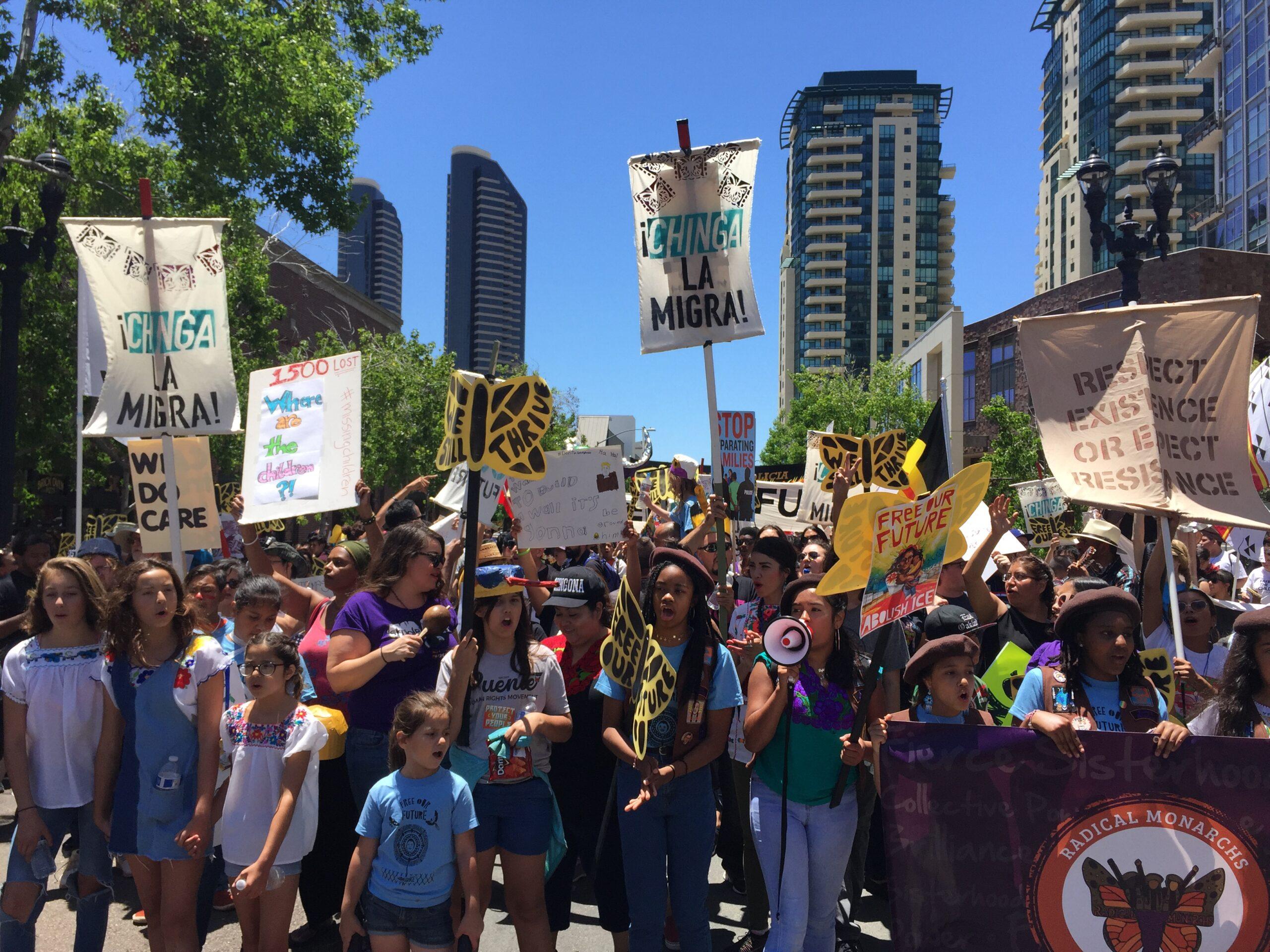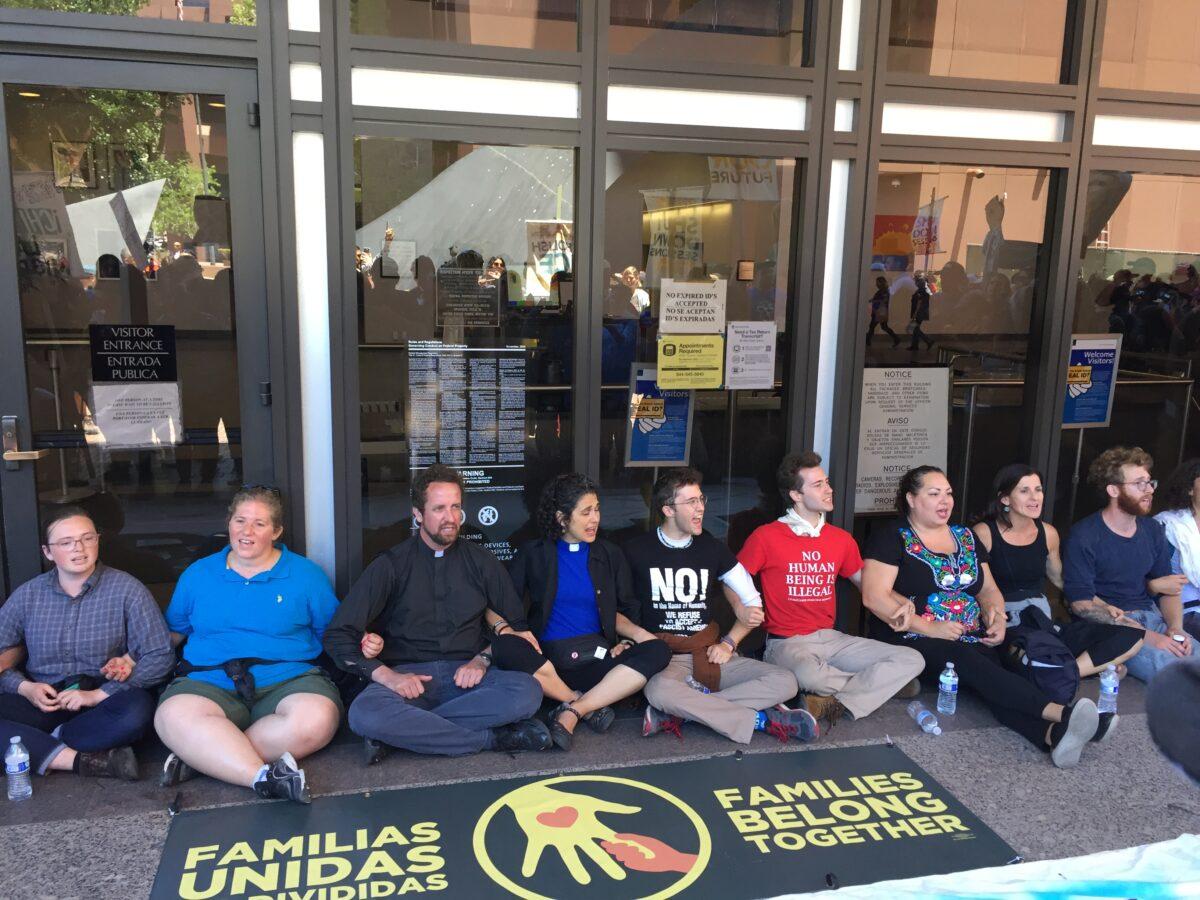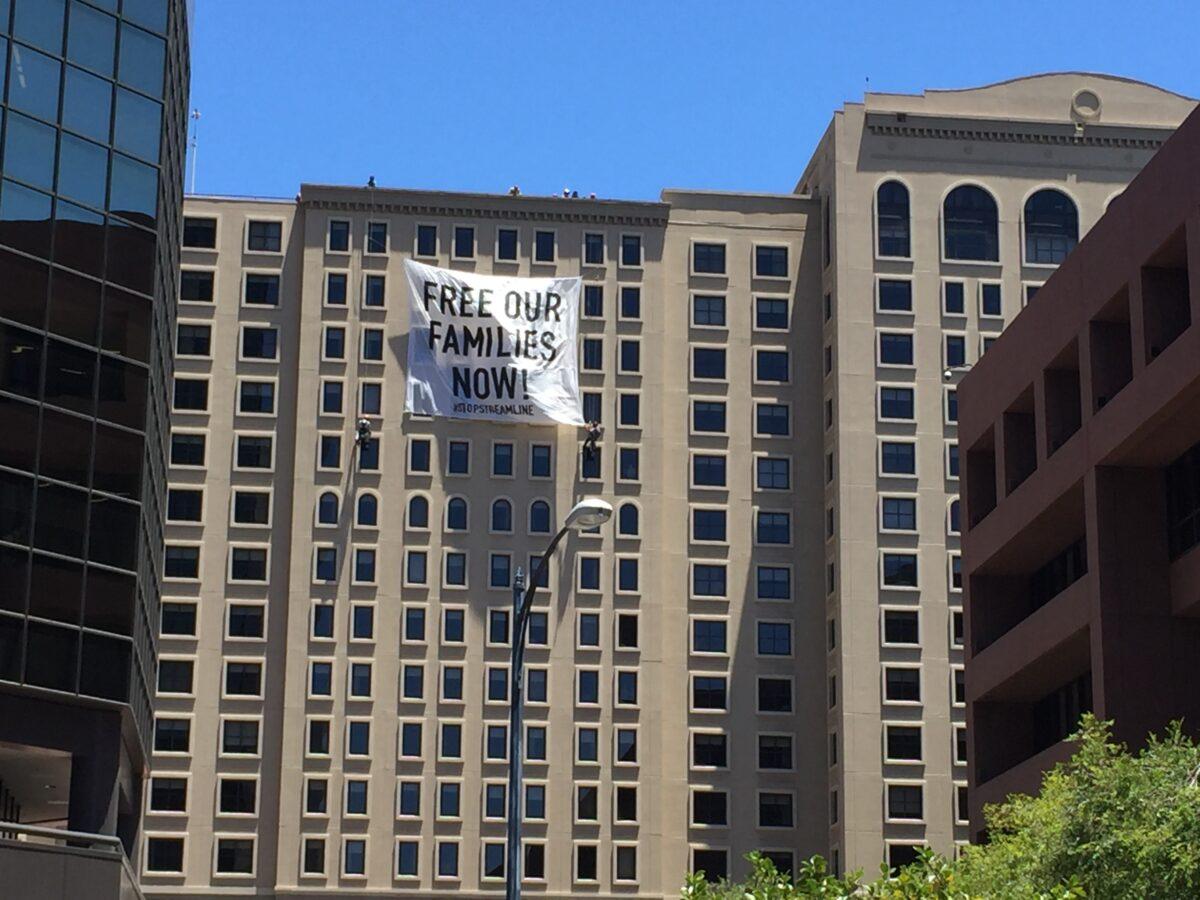Immigrants and activists flood San Diego to protest ‘Operation Streamline’
Defense attorneys say they’ll have only minutes to meet with their clients before the immigrants are convicted en masse.

Starting Monday, immigrants arrested at the California border will be driven to a converted garage in the basement of the Edward J. Schwartz Federal Office Building in downtown San Diego, according to a plan devised by prosecutors and shared with defense attorneys. The immigrants will meet quickly with their attorneys before being taken across the plaza to the federal courthouse. Up to a dozen of them will appear together in the courtroom, most likely in chains, wearing headsets from which they will hear a translation of the proceedings. They will be charged individually with illegal entry, most likely plead guilty, and be sentenced, all within just a few minutes.
This fast-track prosecution process is being unrolled as part of the expansion to the Southern District of California of “Operation Streamline,” a George W. Bush-era program created to speed up prosecutions that is expanding as courts buckle under the growing caseload of the Trump administration’s “zero tolerance” policy.
According to the prosecutors’ plan, the immigrants’ brief meeting with their lawyers will take place in “a room where other lawyers will be meeting with their clients at the same time and where there will be marshals and agents sitting in the back of the room who could potentially hear our conversation,” explained Jami Ferrara, head of the Criminal Justice Act Panel, which assigns lawyers to provide defense for poor people charged with federal crimes, and who was part of a commission assembled by the district’s chief judge to deal with the increase in prosecutions. “It is not a good system,” she said.
Operation Streamline has already been implemented in federal courthouses in Arizona, New Mexico, and Texas, where reporters have witnessed groups of immigrants pleading guilty and getting sentenced in less than a minute per defendant. Ferrara believes that by not allowing immigrants the chance to mount an adequate defense, and with prosectuors generally offering them time served if they plead guilty, the court is compelling thousands of immigrants to plead guilty to federal crimes. That could be a mistake, defense attorneys argue, since some would be better off fighting their charges. Eight out of the nine misdemeanor illegal entry cases represented by Federal Defenders of San Diego that have gone to trial since May have ended in dismissal or a “not guilty” verdict, according to the organization. And there are consequences for pleading guilty: Immigrants who do so could face felony charges if they are re-arrested for the same offense, which carries a potential sentence of years in federal prison.
Federal defenders and magistrate judges have long resisted efforts to expand Operation Streamline to the Southern District of California. But with the surge in prosecutions, the courts system, as well as the federal jail system, have been unable to keep up. Operation Streamline allows U.S. Marshals to avoid jailing defendants, instead taking them directly to federal court from the Border Patrol or ICE stations where they are held in the hours after an arrest. Assuming they plead guilty, they are then handed over to ICE custody, where they face civil immigration proceedings, including determinations regarding asylum claims and possible removal.
Right now, pleading guilty to illegal re-entry does not affect a defendant’s future immigration status. However, according to new draft regulations proposed by the Department of Justice and obtained by Vox, anyone convicted of entering the U.S. illegally would become ineligible for asylum—meaning that mass prosecutions for border crossing without authorization could potentially make countless asylum-seekers unable to ever gain legal status.

Federal public defenders in San Diego have been fighting against the expansion of Operation Streamline since prosecutors began pushing for it in May. In a series of letters written to the chief judge of the district, both Ferrara and Ruben Cahn, the head of the Federal Defenders of San Diego, have brought up serious due process concerns regarding the fast-track prosecutions.
On June 22, Cahn wrote an email to Chief Judge Barry Moskowitz, pointing out how Operation Streamline is part of America’s long legacy of “separate and unequal” tribunals.
“It is worth reflecting on just what the proposed court would look like,” Cahn wrote. “Though charged only with misdemeanors, all defendants in this courtroom will be in custody. … These defendants will not be treated as individuals. Their cases will be heard en masse. For most, there will be no ‘initial appearance’ and no consideration of bond. These defendants will face a choice between pleading guilty in hopes of immediate release or waiting two, three, or four weeks for a trial to challenge the government’s case against them. The faces of defendants will all be brown. All will be aliens, a class of people historically subject to discrimination.”
Cahn compares this to how the court regularly adjudicates federal misdemeanors in the Southern District: “Defendants [in those cases] will walk into the courtroom through the same door as the public, as free men and women. They will not be chained. They will be treated as individuals, their cases heard separately. No coercive influence will urge them to resolve their cases and plead guilty to obtain their freedom. The faces of defendants in this special courtroom will be of every color. They will not be marked as aliens.”
Moskowitz did not respond to a request for comment from The Appeal. In the order that he filed in May to form the committee that led to the expansion of Operation Streamline, he wrote that the increase in prosecutions “has and will cause strains, issues and problems for the court and its personnel.”
In response to The Appeal’s request for more details about the rollout of Operation Streamline, the Department of Justice wrote: “Beginning on July 9, the district court will be placing an additional magistrate judge on rotation to handle misdemeanor immigration cases. We look forward to our continued work with this committee to effectively implement this program in a manner that protects the constitutional rights of these defendants.”
Ferrara contests the notion that the plan for Operation Streamline was the result of input from all members of the committee. “We are not creating this court. We are responding to their demands. The court is responding to their demands,” Ferrara told The Appeal. “This is not collaborative. It’s reactive.”

This week, hundreds of people marched through downtown San Diego to the federal courthouse in opposition to Operation Streamline and the practice of separating families at the border, as part of a series of civil disobedience actions organized by the Latinx-led organization Mijente.
“We already live in a highly militarized area, we don’t need more border patrol or more prosecutions” said San Diego resident Itzel Guillen, 24, a DACA recipient who works with the community organization Alliance San Diego. Guillen spoke at a rally in San Diego’s Chicano Park shortly before the march to the federal courthouse began. “Our border communities are among the safest in the nation. It doesn’t make sense to invest in that instead of infrastructure and education.”
As part of the civil disobedience actions, protesters disrupted arraignments of immigrants in federal court before they were removed by U.S. Marshals. As the estimated 600-person march reached the federal courthouse in downtown San Diego, activists rappelling down the side of a nearby hotel unfurled a banner that read “Free Our Families Now! #stopstreamline.” Clergy members formed a human barricade in front of the federal office building, where protesters demanded the end of Operation Streamline as well as the abolition of ICE.
Elizabeth Estrada, a member of Mijente, came to San Diego from the Bronx for the march. “I’m an immigrant from Mexico and I didn’t want to just stay home. I wanted to come out in direct opposition to deportation and streamline policies to deport people without any type of representation or a trial,” Estrada told The Appeal. “We do not need to expand Operation Streamline. We need to end it.”
